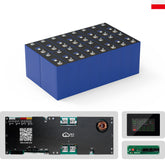How Fast is 48V 1500W in MPH A Comprehensive Guide to Understanding Performance
When it comes to electric vehicles like e-bikes, scooters, or go-karts, one of the most frequently asked questions is: "How fast can a 48V 1500W motor go in MPH?" This question is critical for anyone looking to understand the performance potential of their electric-powered vehicles. The answer isn’t as simple as just looking at the wattage or voltage, as several factors, such as weight, terrain, and motor efficiency, play a key role in determining the top speed.
In this comprehensive guide, we will break down everything you need to know about the performance of a 48V 1500W motor, how it affects your vehicle’s speed, and the factors that can influence this. Whether you're an e-bike enthusiast, a scooter rider, or just curious about electric motor performance, this article provides detailed insights to help you understand how fast a 48V 1500W motor can really go.
- What is a 48V 1500W Motor?
- How Fast Can a 48V 1500W Motor Go?
- Factors Affecting the Speed of a 48V 1500W Motor
- Real-World Performance of a 48V 1500W Motor
- Maximizing the Performance of a 48V 1500W Motor
What is a 48V 1500W Motor?
The Basics of Electric Motors
Before diving into speed specifics, it's important to understand the basic components that define an electric motor. A motor’s voltage (in this case, 48V) and wattage (1500W) are critical factors that influence its power and efficiency. The voltage of a motor refers to the electrical potential that drives the flow of current, while wattage is a measure of how much power the motor can generate.
For a 48V 1500W motor, the power output is higher compared to lower voltage systems (such as 36V or 24V). This means the motor has a larger energy capacity and can handle more load or provide faster speeds, depending on the application.
How Does the 48V 1500W Motor Work?
The 48V 1500W motor operates by using a 48-volt power supply (usually from a battery) to generate rotational motion. The wattage of 1500W indicates the motor’s power output. This is enough for various applications, such as e-bikes, scooters, and small electric vehicles, where moderate to high speeds are desired.
In simple terms, the higher the voltage and wattage, the more power is available to drive the motor, potentially resulting in higher speeds, particularly when paired with lightweight vehicles.
>>See also How To Determine The Right Solar Panel Size For Charging A 12v Battery
How Fast Can a 48V 1500W Motor Go?
Top Speed Estimates for a 48V 1500W Motor
A 48V 1500W motor can reach different speeds depending on several factors, but a general estimate for a typical e-bike or electric scooter is between 20 to 28 miles per hour (MPH). This is based on a standard setup, which includes the motor, battery, and vehicle.
Here are the key factors that influence speed:
- Motor Power: A 1500W motor has the power to generate speeds that are higher than typical lower-wattage motors, like those rated at 250W or 500W.
- Vehicle Weight: Lighter vehicles will generally achieve higher speeds compared to heavier ones, as less energy is needed to move the vehicle.
- Terrain: Riding on flat terrain will allow the motor to reach its top speed, whereas hills, rough terrain, or obstacles can slow it down.
- Rider Weight: The combined weight of the rider and the vehicle also impacts speed, with heavier riders seeing slightly reduced top speeds.
Calculating the Speed of a 48V 1500W Motor
While it's difficult to pinpoint an exact speed for every situation, we can calculate an approximate top speed based on the basic power-to-weight ratio. For example, an e-bike with a 48V 1500W motor on a flat road might reach 20-25 MPH with a rider weighing around 150-200 lbs.
To calculate the theoretical top speed:
- Power (W) = Voltage (V) × Current (A), so a 1500W motor running on 48V can draw about 31.25 amps (1500W ÷ 48V).
- Speed Calculation: The top speed will vary based on motor efficiency, wheel size, and other factors, but for a typical e-bike, 1500W will generally allow speeds in the 20-28 MPH range.
Factors Affecting the Speed of a 48V 1500W Motor
Rider and Vehicle Weight
One of the most significant factors influencing the speed of a 48V 1500W motor is the combined weight of the rider and the vehicle. More weight requires more power to maintain the same speed, which can result in a reduction in the top speed. A lighter rider on a lightweight e-bike, for example, will see higher speeds compared to a heavier rider.
Terrain and Environmental Conditions
The condition of the terrain plays a significant role in determining how fast a 48V 1500W motor can go. On flat, smooth surfaces, such as paved roads, the motor will likely reach its optimal top speed. However, on uphill terrain, rough paths, or in windy conditions, the motor may struggle to maintain the same speed, resulting in a noticeable reduction in performance.
- Uphill Terrain: The motor will work harder to overcome gravity, reducing the top speed.
- Downhill: The speed could exceed the maximum rated speed due to gravitational assistance, but this is usually limited by safety mechanisms in the vehicle's design.
Motor Efficiency
The efficiency of the motor itself is another factor. Not all 48V 1500W motors are created equal. Some are designed for higher efficiency, while others might have lower quality or design issues that reduce their overall performance. A high-quality motor with better power conversion will allow for smoother acceleration and higher top speeds.
Real-World Performance of a 48V 1500W Motor
E-Bikes with 48V 1500W Motors
E-bikes are one of the most common applications for a 48V 1500W motor. Depending on the bike’s weight and the terrain, a 48V 1500W motor can provide excellent performance, with speeds typically in the 20-28 MPH range. High-quality e-bikes designed for off-road riding or urban commuting can perform well within this range, offering both speed and range for riders.
Electric Scooters and Go-Karts
Electric scooters and go-karts with 48V 1500W motors can also achieve similar speeds, depending on the design. Many electric scooters in this range offer 20-25 MPH, ideal for urban commuting. Go-karts may see slightly lower top speeds, around 15-25 MPH, due to their weight and design, but they benefit from strong acceleration and torque.
>>See also Can You Use 4 12V Batteries Instead Of 6 8V Batteries In A Golf Cart
Maximizing the Performance of a 48V 1500W Motor
Regular Maintenance for Speed Optimization
To get the best speed and performance out of a 48V 1500W motor, regular maintenance is essential. Proper care of the motor, battery, and wheels ensures smooth functioning and maximizes the motor’s potential.
- Battery Health: Ensure the battery is regularly charged and maintained to prevent power loss or inefficiency. A well-maintained battery allows the motor to operate at peak performance.
- Tire Pressure: Proper tire inflation reduces rolling resistance and helps maintain higher speeds, especially on flat terrain.
- Motor Cleaning: Keeping the motor clean from dirt, debris, and moisture helps maintain its efficiency.
Upgrading Components for Faster Speeds
If you’re looking to increase the top speed of your 48V 1500W motor, consider upgrading certain components:
- Larger Wheels: Larger wheels reduce rolling resistance and can increase the top speed.
- High-Performance Controller: A performance controller can help regulate power more efficiently and potentially push the motor to higher speeds.
- Better Batteries: Upgrading to high-quality batteries that can provide more consistent voltage will support the motor’s peak performance.
The question "How fast can a 48V 1500W motor go in MPH?" can be answered with a general range of 20 to 28 MPH, depending on factors like vehicle weight, rider weight, terrain, and motor efficiency. While the motor itself provides sufficient power to reach these speeds, external factors such as road conditions, maintenance, and additional upgrades can influence real-world performance.
Whether you're riding an e-bike, scooter, or go-kart, understanding how the 48V 1500W motor works, along with the elements that affect speed, will help you get the most out of your electric vehicle. By maintaining your vehicle and considering enhancements, you can improve speed, efficiency, and overall performance.
























Leave a comment
All blog comments are checked prior to publishing